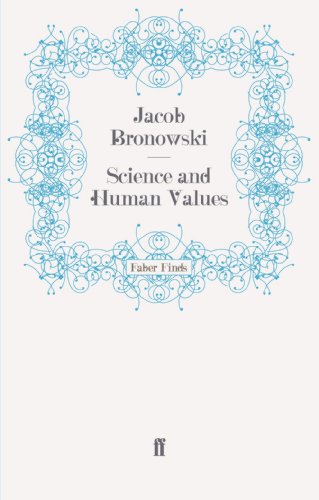Science is the Knot Tying it all together
The creation was a concept—a connected set of concepts. There was the concept of a universal gravitation-reaching beyond the tree tops and the air to the ends of space. There was the concept of other universal forces in space, which ti to pull the moon away as a whirling stone pulls away fro: its string. And there was the concept which put an end to the four elements of Aristotle: the concept of mass, alike in t apple and the earth and the moon, in all earthly and heavenly bodies.**
All these are real creations: they find a unity in what med unlike. They are symbols; they do not exist without the creation. Solid as it seems, there is no such thing as mass; as Newton ruefully found, it cannot be defined. We experience mass only as the behavior of bodies, and it is a single concept only because they behave consistently.
Indeed, the concept of mass is a peculiarly apt example. For in the physics of Newton there are two concepts of mass, which are distinct. One is the inertial mass of a body—that which must be overcome when it is thrown. The other is the gravitational mass of the same body—that which must be \ overcome when it is lifted from the ground. Newton knew, of course, that the inertial mass is equal to the gravitational mass; but why are they equal, why should they be the same single mass? This is a question which Einstein asked; and in order to answer it he built in 1915 the whole theory of General Relativity. Only in that theory were the two faces of mass made one, and made the unity which is the single concept, mass.
This sequence is characteristic of science. It begins with a set of appearances. It organizes these into laws. And at the center of the laws it finds a knot, a point at which several laws cross: a symbol which gives unity to the laws themselves. Mass, time, magnetic moment, the unconscious: we have grown up with these symbolic concepts, so that we are startled to be told that man had once to create them for himself. He had indeed, and he has; for mass is not an intuition in the muscle, and time is not bought ready-made at the watch¬ maker's.
And we test the concept, as we test the thing, by its implications. That is, when the concept has been built up from some experiences, we reason what behavior in other experiences should logically flow from it. If we find this behavior, ^e go on holding the concept as it is. If we do not find the behavior which the concept logically implies, then we must go back and correct it. In this way logic and experiment are locked together in the scientific method, in a constant to and fro in which each follows the other.
Notes:
Throughout the centuries, scientists postulate hypotheses, and later scientists connect them to others to form stronger, more universal theories.
Folksonomies: science scientific process
Taxonomies:
/science/physics (0.550084)
/law, govt and politics/legal issues/civil law/copyright (0.420567)
/science (0.416897)
Keywords:
concept (0.905765 (negative:-0.070109)), mass (0.806886 (negative:-0.221816)), single concept (0.752844 (negative:-0.465380)), inertial mass (0.687037 (negative:-0.797473)), peculiarly apt example (0.685430 (positive:0.329341)), gravitational mass (0.647756 (negative:-0.724142)), Knot Tying (0.580527 (neutral:0.000000)), tree tops (0.573375 (negative:-0.333521)), whirling stone (0.571276 (neutral:0.000000)), later scientists (0.566207 (neutral:0.000000)), heavenly bodies.** (0.563964 (positive:0.406720)), real creations (0.563720 (positive:0.429610)), universal theories (0.563525 (neutral:0.000000)), universal forces (0.553035 (neutral:0.000000)), General Relativity (0.548780 (neutral:0.000000)), single mass (0.546435 (negative:-0.580927)), magnetic moment (0.545474 (neutral:0.000000)), scientific method (0.543829 (neutral:0.000000)), watch¬ maker (0.542222 (negative:-0.247606)), symbolic concepts (0.535738 (neutral:0.000000)), behavior (0.513817 (negative:-0.309417)), Newton (0.510912 (neutral:0.000000)), unity (0.509511 (neutral:0.000000)), laws (0.497610 (negative:-0.453748)), thing (0.466676 (neutral:0.000000)), science (0.466404 (neutral:0.000000)), moon (0.465043 (positive:0.340913)), body—that (0.462640 (negative:-0.760807)), space (0.460698 (negative:-0.333521)), theory (0.453710 (negative:-0.386787))
Entities:
Newton:Person (0.940831 (neutral:0.000000)), Einstein:Person (0.543390 (neutral:0.000000)), apple:Company (0.501618 (positive:0.340913))
Concepts:
General relativity (0.954671): dbpedia | freebase | opencyc
Scientific method (0.934892): dbpedia | freebase
Inertia (0.883449): dbpedia | freebase
Force (0.867171): dbpedia | freebase | opencyc
Logic (0.842425): dbpedia | freebase | opencyc
Classical mechanics (0.764164): dbpedia | freebase
Physics (0.760582): dbpedia | freebase | opencyc
Mathematics (0.709290): dbpedia | freebase | opencyc





